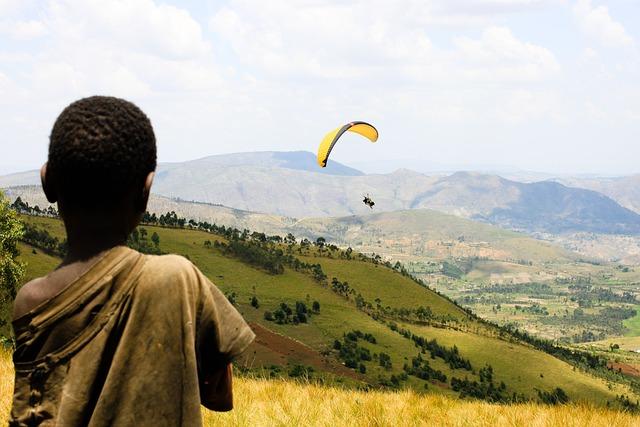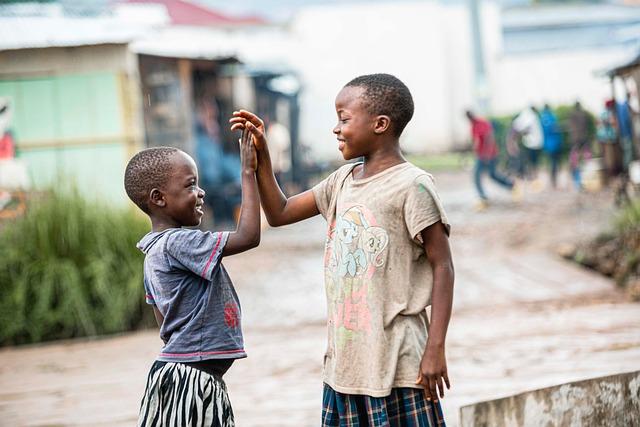In a landmark initiative aimed at advancing educational opportunities for girls and women, Burundi has hosted its first national forum dedicated specifically to their educational needs. Organized by UNICEF, this event highlights the urgent necessity of addressing the barriers that prevent young females from accessing quality education in the country. With a focus on fostering dialog among policymakers, educators, and community leaders, the forum seeks to develop actionable strategies to enhance women’s educational outcomes and empower the next generation. As burundi grapples with various socio-economic challenges, this forum represents a critical step towards achieving gender equality in education and ensuring that girls can realise their full potential.
Burundi Takes a Historic Step Towards gender Equality in Education
Burundi has taken a transformative stride towards promoting gender equality in education with its inaugural national forum dedicated to girls’ and women’s education. Organized by the Ministry of Education in collaboration with UNICEF, this landmark event has gathered stakeholders from various sectors, including government officials, educators, and community leaders. The forum aims to address critical barriers that girls face in accessing quality education, emphasizing the need for systemic changes to foster an inclusive educational surroundings. Participants engaged in discussions on key issues such as early marriage, gender-based violence, and economic limitations that hinder girls’ educational achievements.
Among the major outcomes of the forum, several action points were established to ensure that girls receive equal educational opportunities. These include:
- Awareness Campaigns: Initiatives to inform communities about the importance of girls’ education.
- Policy Implementation: Advancement of policies that prioritize gender equality in educational institutions.
- Partnerships: Collaborating with NGOs and the private sector to provide scholarships for underprivileged girls.
- Mental Health Support: Providing resources and support for girls facing trauma or discrimination.
Key Objectives and Themes of the National Forum for Girls’ and Women’s Education
The forum aimed to address several key objectives essential to enhancing the educational landscape for girls and women in Burundi. Among these objectives were the promotion of equal opportunities in education, the elimination of barriers that hinder girls’ access to schooling, and the establishment of a supportive environment for female students. Additionally, the forum underscored the importance of community involvement and parental engagement to foster a culture that values and prioritizes girls’ education. this approach is vital for building a strong foundation where equal educational rights are recognized and upheld.
Furthermore, the discussions highlighted several themes that resonated throughout the event. Key themes included:
- Empowerment through Education: Fostering a sense of agency among young women.
- health and Wellbeing: addressing the health challenges that affect girls’ education.
- Skill Development: Equipping girls with skills for the 21st century job market.
- Advocacy and Policy Change: Promoting legislative reforms to strengthen girls’ rights.
The collaborative efforts highlighted during the forum demonstrated a commitment from stakeholders, including government representatives, NGOs, and local communities, to create actionable strategies that would lead to transformative changes in the education sector.
The Role of UNICEF in Supporting Educational Initiatives in Burundi
UNICEF plays a crucial role in advancing educational initiatives in Burundi, notably focusing on empowering girls and women.Through various programs and partnerships, UNICEF aims to ensure that every girl in Burundi has access to quality education, which is essential for her personal development and the overall progress of the nation. Key initiatives include:
- Providing scholarships: Financial support that enables girls from low-income families to attend school.
- Training teachers: Enhancing the quality of education through professional development focused on gender-sensitive teaching methods.
- Community awareness campaigns: Promoting the importance of girls’ education among parents and community leaders.
Additionally,UNICEF collaborates with local governments and non-governmental organizations to strengthen educational infrastructure. This includes constructing safe schools, ensuring access to necessary learning materials, and implementing health and nutrition programs that keep girls in school. A recent national forum organized for girls’ education has been a pivotal platform for discussing barriers and solutions, showcasing UNICEF’s commitment to fostering an environment where girls can thrive. The forum served as a venue to share success stories, engage stakeholders, and address challenges such as:
| Challenge | Proposed Solution |
|---|---|
| High dropout rates | Introduce mentorship programs |
| lack of sanitary facilities | Build girls’ toilets in schools |
| Gender-based violence | Implement safety training and policies |
Challenges Facing girls’ Education in Burundi and Proposed Solutions
The path to educational equity for girls in Burundi is laden with multifaceted challenges that hinder their academic progress and future opportunities. Cultural norms frequently enough prioritize boys’ education over girls’, leading to lower enrollment rates for females. Economic hardships also compound the issue, as many families view girls as contributors to household income rather than students. Additionally, insufficient school infrastructure and a lack of female teachers create an unwelcoming learning environment. The prevalence of early marriages and teenage pregnancies further exacerbates school dropouts among young girls, trapping them in cycles of poverty and limiting their prospects.
Addressing these challenges requires a extensive strategy that involves multiple stakeholders.Proposed solutions include:
- Enhancing community awareness campaigns that highlight the benefits of girls’ education and dismantle harmful stereotypes.
- Offering financial incentives, such as scholarships and stipends, to families who keep their daughters in school.
- Investing in improved school facilities and resources to create safe and girl-friendly learning environments.
- Implementing programs to train and recruit female teachers, which can serve as role models and help foster a supportive atmosphere.
- Establishing health education and mentorship initiatives that prepare girls to navigate challenges such as early marriage and pregnancy.
Through collective efforts and targeted interventions, Burundi can pave the way for a brighter future for its girls, ensuring that education becomes a right rather than a privilege.
Voices from the Forum: perspectives of Young women and Educators
The voices raised at the forum resonated with determination and hope as both young women and educators shared their experiences and aspirations for a brighter future in education. Young women expressed their longing for more inclusive learning environments where their voices are not only heard but valued.they highlighted the importance of mentorship programs that connect them with role models who can guide them through educational challenges. Educators reiterated the necessity of fostering critical thinking and creative expression, noting that an empowered girl is vital for community advancement and positive societal change. This collective vision is pivotal in addressing barriers that hinder access to education for girls across the region.
| Key Issues Raised | Perspectives |
|---|---|
| accessibility to Education | Stronger policies needed to ensure equitable access |
| Gender Disparities | Urgent call for targeted scholarships and support |
| Safety in Schools | Create a safe environment for all students |
| Mentorship Opportunities | Supportive networks to guide young women |
The forum also served as a powerful platform for advocates to unite their voices in a common cause. Educators shared best practices and innovative teaching methods that promote equitable learning. They emphasized the role of community engagement in driving policy changes and fostering a culture that values girls’ education.The exchanges highlighted a shared commitment: to build not just classrooms, but community spaces where learning flourishes for every girl. This collaborative spirit underscored the belief that empowering women through education is the foundation of sustainable development in Burundi.
Recommendations for Sustained Progress in Girls’ and Women’s Education in Burundi
To foster sustained progress in girls’ and women’s education in Burundi,a multi-faceted approach is vital. Investment in infrastructure is crucial; adding more schools, especially in rural areas, can help close the accessibility gap. Additionally, recruiting and training qualified female teachers will serve as role models and enhance the learning environment.Community awareness campaigns should focus on the importance of female education to parents and guardians. Here are some key recommendations:
- Enhance government policies: Establish and implement supportive policies that prioritize funding and resources for girls’ education.
- Build partnerships: Collaborate with NGOs, international organizations, and local communities to promote educational programs tailored for girls.
- Encourage mentorship programs: Create mentorship and peer support systems to empower young women throughout their educational journey.
Furthermore, addressing cultural barriers that deter girls from pursuing education is essential. Engaging community leaders to advocate for girls’ right to education can help facilitate societal shifts in perceptions. Implementing flexible school schedules and providing safe transportation can alleviate concerns for families hesitant to send their daughters to school. A strategic investment in these areas can yield a significant impact on the educational landscape for girls in Burundi:
| Area of Focus | Action Steps |
|---|---|
| Infrastructure | Build more schools; improve existing facilities |
| Community engagement | Conduct workshops; involve local leaders |
| Transportation | Provide safe travel options; establish school bus services |
In Summary
the inaugural national forum for girls’ and women’s education in burundi marks a significant step towards addressing the educational disparities that have long affected these demographics. Organized by UNICEF, the forum brought together stakeholders from various sectors, highlighting the urgent need for a collective commitment to advancing educational opportunities for girls and women across the country. By fostering dialogue and collaboration among educators, policymakers, and community leaders, this initiative not only aims to empower young women through education but also seeks to transform societal norms and promote gender equality in all aspects of life. As Burundi embarks on this crucial journey,the outcomes of the forum will serve as a foundation for sustained efforts to ensure that every girl has the opportunity to learn,grow,and contribute to her community. The impact of such initiatives will resonate far beyond the classroom, shaping the future of an entire nation.

